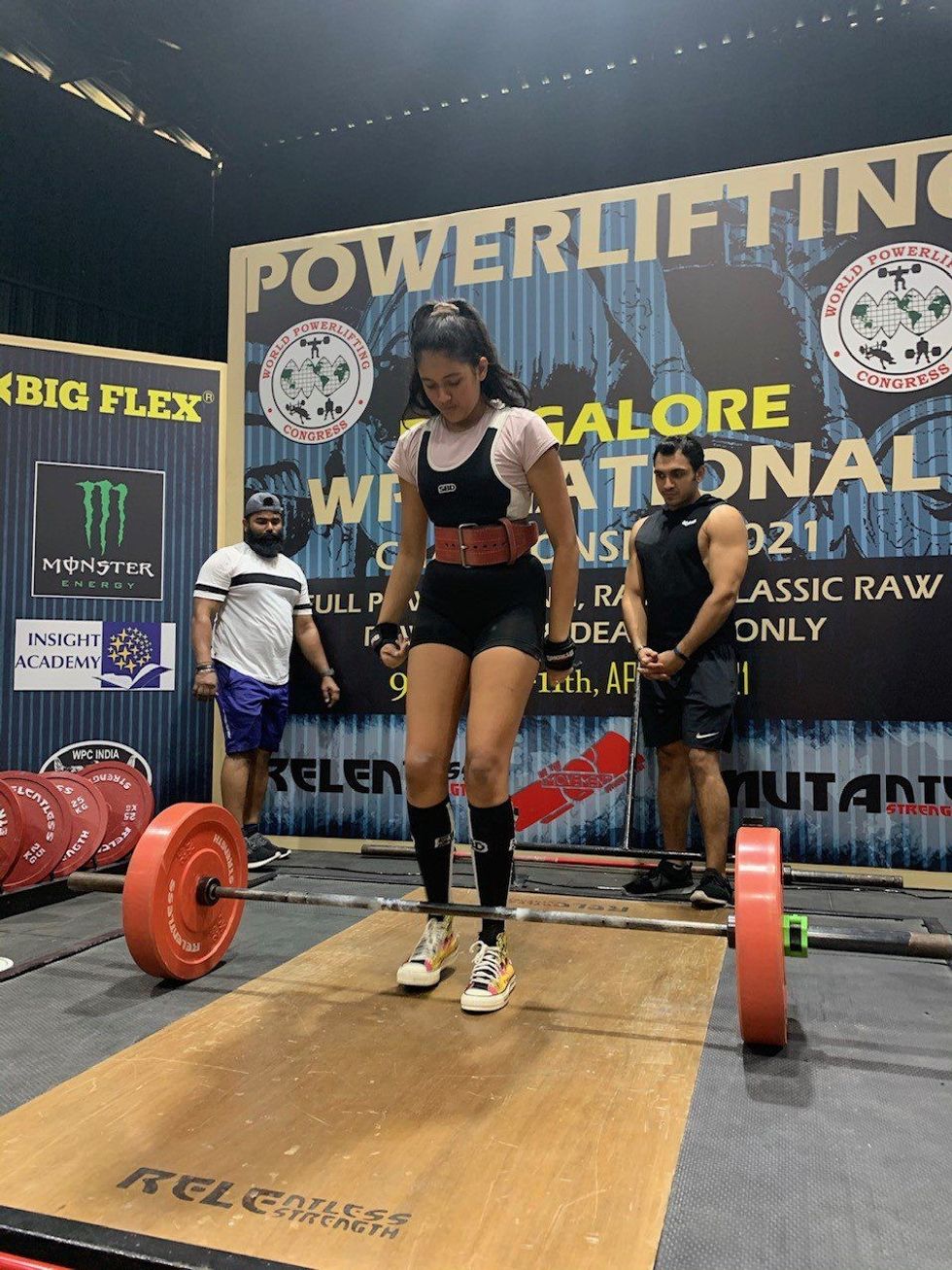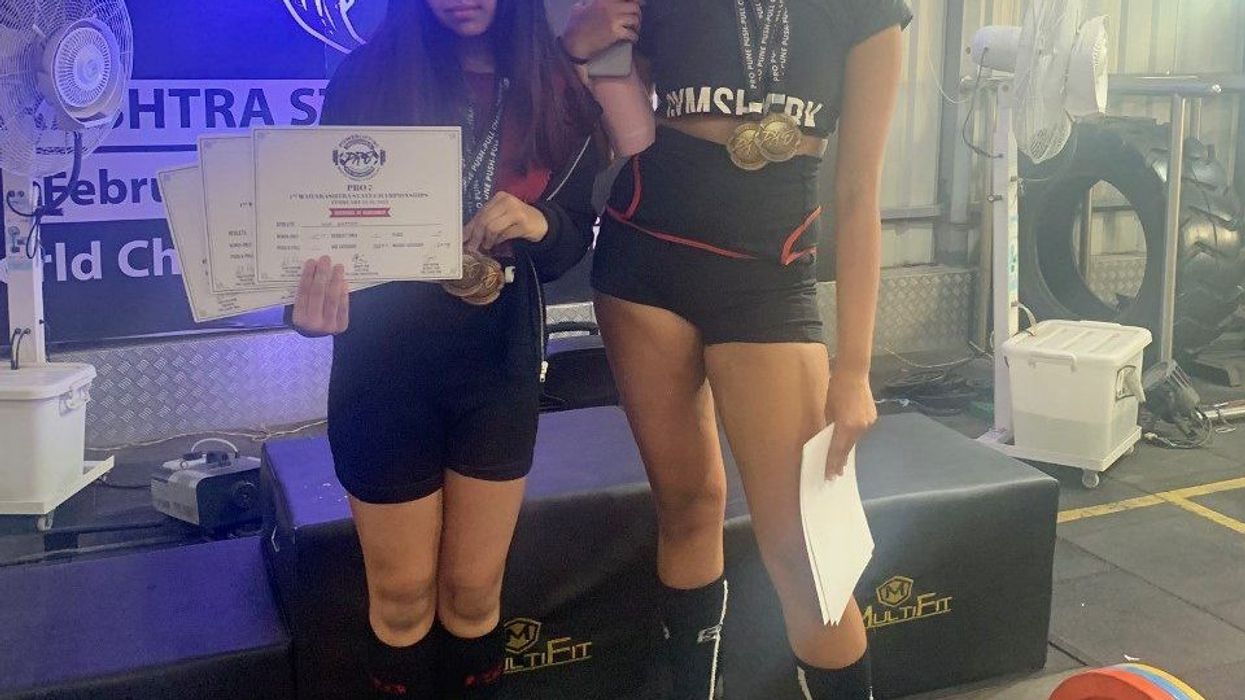Two young teenage girls with astounding strength can likely lift more than you.
Kasha Sachdev, 15, started powerlifting at the age of eight and 13-year-old Noa Eappen was inspired to join her when she was 10. The firm friends, trained by Sachdev’s professional power lifter and body builder father Nicholai Sachdev, have won multiple gold medals picking up heavy weights, along with becoming strong role models. Their achievements have included setting world records.
The Mumbai-based girls are looking forward to representing India for the first time internationally at the WPC-Powerlifting Open European Championship in June 2023. Eastern Eye caught up with the great symbols of girl power to discuss their weightlifting journey.

Kasha, could you tell us what inspired you to start powerlifting?
Kasha: I had watched my father Nicholai Sachdev lift and strive for strength (and inherently, perfection) in the gym from a young age. I had the condition Genu Valgum, more commonly known as ‘knock knees’ and was put through two corrective surgeries for it. Physiotherapy and occupational therapy had been medically prescribed to me for rehabilitation, but my father, after copious amounts of research, thought it a better idea to train me in the gym.
How did you start learning to lift weight as an eight-year old?
Kasha: I started with simple movements, slowly progressing onto the three fundamental powerlifting movements, the bench press, squat, and deadlift. I progressively increased the weight and subsequently my strength. This, over the course of a few years, fixed my knees and developed my passion for powerlifting. It instilled my belief that everything happens for a reason; if it weren’t for my knee condition, it’s doubtful I would have taken up this fantastic sport of powerlifting.
Noa, what was the first thing that you liked about powerlifting?
Noa: The first thing I liked about powerlifting was how it made me feel. Powerlifting empowered me to know that I’m not like every other girl, but a strong teenager in a male-dominated sport, who can inspire other women to be strong and tough.
When did it become a passion?
Noa: When I first started powerlifting, I wasn’t sure if this is something I’d like to take up professionally. Slowly I realised the sport requires physical strength, but also requires mental will. I gradually began to hit bigger numbers and was hooked sooner than I thought. It made me happy to just be under the bar and push as hard as I could.

What has been your most memorable moment in powerlifting?
Noa: My most memorable moment has been winning three golds at the WPC Nationals in Bangalore. I was excited to win my first medal, but was even more thrilled as Kasha, who is like an older sister to me, also won gold in all three categories. We were both ecstatic for each other.
Kasha: Powerlifting, in my opinion, is very rewarding. I feel grateful just waking up feeling strong every day, seeing my lifts go up every week. All the victories in competition and various achievements are a reminder of all the hard work and dedication we put into training. That hard work gifts us moments we will never forget.
You train together in the gym. How much do you both motivate one another?
Noa: Kasha and I are like sisters, so we always have each other’s back. We push each other, but also cry together when we miss big lifts. When I lift, the loudest voice I hear is hers. I draw a lot of strength from her motivation.
How do you balance training with school?
Kasha: I train for a couple of hours, five to six times a week at 6.30am before school, and do cardio after school for an hour, alongside studying, tutoring, other extracurriculars, assignments and school in general. I manage the balance, but it does get tough sometimes. I try to schedule everything down to the minute, which helps me get a better hold on the tasks at hand.
How does it feel being stronger than your schoolmates, including boys?
Kasha: It now feels more normal. I’m very proud of those around me for normalising women empowerment, especially in fields where it was a social anomaly to have a woman contestant, in strength sports like powerlifting. This will, of course, be a long-lived fight for equal representation but it’s nice to see that other students aren’t shocked by a young woman competing in powerlifting and being relatively stronger than them.
What are your future hopes in powerlifting?
Noa: I don’t know how long I will be powerlifting professionally, but before that time comes, I have many more medals to win and competitors to beat. Right now, I am focused on competing internationally. I have the WPC European Powerlifting meet in Kyrgyzstan in June, where I hope to set a new world record in my weight category.
Powerlifting requires dedication. What is the secret of remaining motivated?
Kasha: To stay motivated, I try to maintain short-term goals, either with the weight I lift, or certain muscles I want to grow or strengthen. This gives me clarity and an immediate sense of success, which is so rewarding. Consistency and well-earned rests keep me motivated through months of long hours in the gym.
Why do you love powerlifting?
Noa: I love powerlifting because of the confidence I have gained through the process. It made me comfortable in my own skin. I’ve learned the value of discipline and drive. It has taught me that perseverance, hard work, grit, and regime will always pay off.
Kasha: It’s been a part of my life for as long as I can remember. I love it for the challenges - powerlifting calls for physical and mental strength, endurance, and skill. I love the competitive spirit and sense of belonging powerlifting gives me. It makes me feel confident, beautiful, and strong.
Instagram: @noacanlift & @kasha_nia_sachdev




